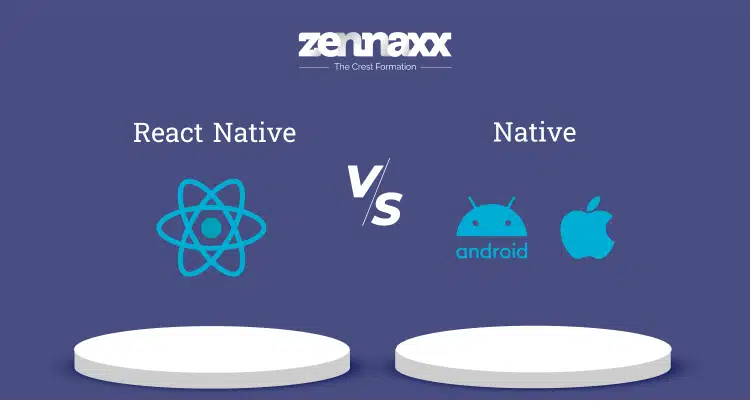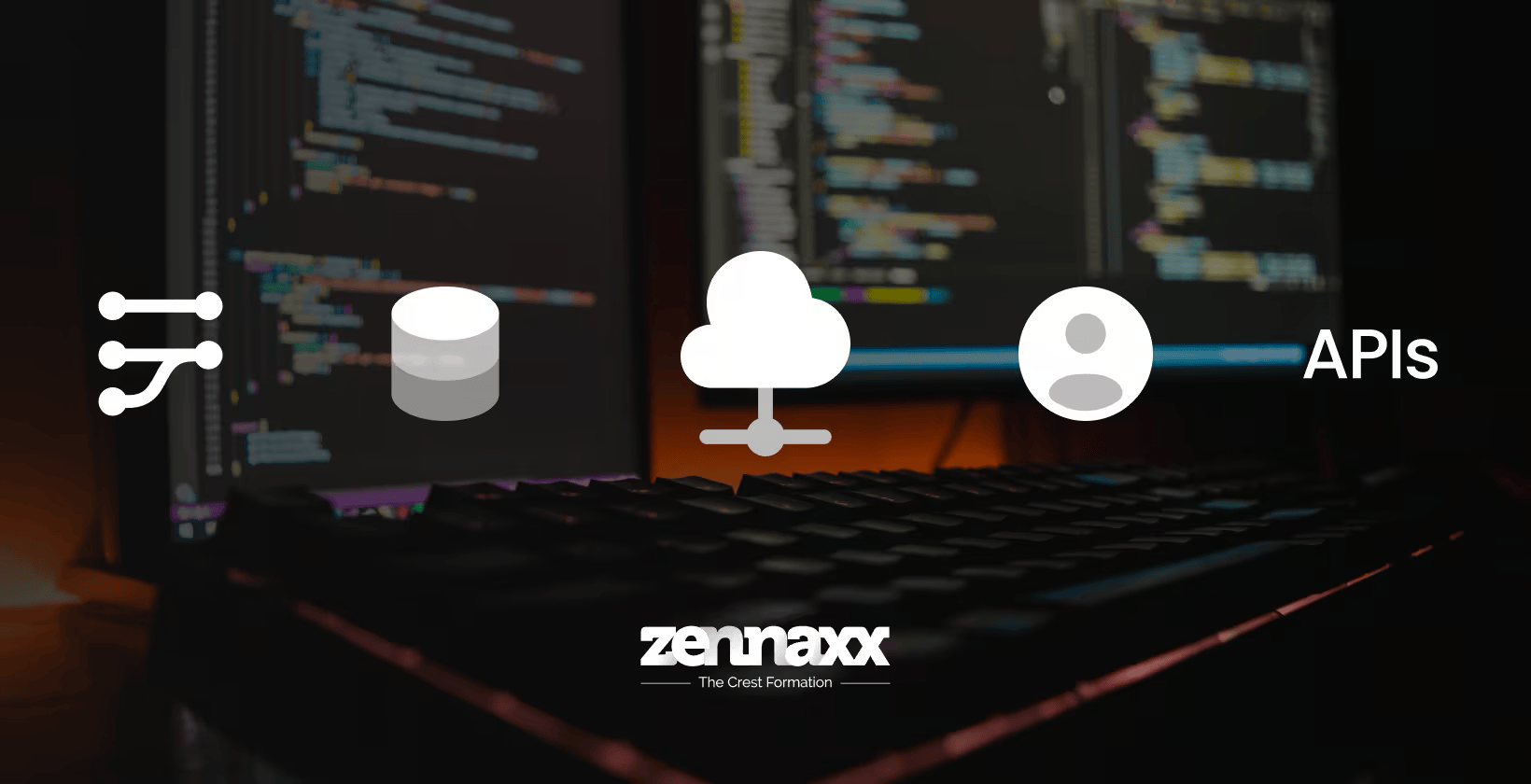You need to pick the right technology stack if you are a mobile app developer or business owner.
Selecting between native and React Native is a common riddle nowadays.
Software developers have traditionally used native languages to make mobile apps.
But now that React Native is more popular, many popular mobile apps are being rewritten.
These include Facebook, Instagram, Pinterest, Uber, Discord, SoundCloud, and Skype.
Mobile developers have a big problem to solve: should they use React Native instead of full native development for mobile apps?
Zennaxx will provide you with common factors to help you choose the best platform before you make any decisions.
In this guide, you will learn about React Native vs. native development, emphasizing their advantages and disadvantages to help you choose the one that best suits your requirements.

Brief overview of React Native vs Native application development
Native Application
A native application is created for a platform or device. Because it is tailored to a specific operating system, it can fully use the device’s hardware and software capabilities.
This results in improved performance and the ability to leverage cutting-edge technologies like biometrics or augmented reality more effectively than web or mobile cloud apps designed to be generic across multiple systems.
React Native Application
React Native is a mobile application development framework that uses JavaScript to create native iOS vs Android applications.
Because it uses native components to render the user interface (UI), it has the same look and feel as the native app while being easier to move around and using a familiar development process.
Created by Facebook, React Native facilitates smooth and easy cross-platform mobile development.
The main programming language in React Native is JavaScript, and the JSX extension is, by default, included to make writing declarative UI components easier.
Factors to Consider for Deciding The React Native vs Native Right Mobile App Development Approach
Both platforms are the best for developing mobile apps. Looking at some of the most important things to think about when choosing between React Native and Native mobile app development:
1. Development Time
When comparing native development to React Native, it is very important to consider the time it takes to develop.
Due to their technical differences, native development requires writing separate code for both Android and iOS platforms.
This requires two distinct teams—an Android development team and an iOS development team—to make your app available on both platforms.
Additionally, any change in the code requires rebuilding and running the entire project, leading to extra effort and increased development time.
With React Native, the same developers can write a single codebase for both platforms.
This means the same code can be used to make apps for both Android and iOS. Hot reloading in React Native further reduces development time and effort by allowing you to deploy changes without having to rebuild the project.
2. Mobile App Cost
When selecting the best technology for your project, keep the mobile app development cost in mind.
According to leading mobile app development companies, developing an app with React Native can save 30%-35% of the cost of developing a native app for the same project.
This is because React Native lets you use the same code on multiple platforms, which speeds up the development process.
React Native also has a large and active community of developers who support and keep the technology up to date.
So, if price is the most important thing to you, React Native is the best choice for developing your mobile app.
3. UI/UX Experience
When comparing React Native to native development, users’ interfaces (UI) and experiences (UX) are important considerations.
There are two types of code in React Native: platform-specific code and functional code, which can be used more than once.
It can be hard to create a complex UI with custom views, navigation patterns, animations, and smooth transitions, though. It is also hard to ensure that UI/UX standards are the same on Android and iOS.
The UI/UX of mobile apps is improved when they are developed natively since every screen is specifically made for both iOS vs Android platforms.
Since Native development provides better mobile app experiences, it wins the comparison between React Native and Native app development.
4. Scalability
When comparing Native technology to React Native, React Native gives mobile app developers more ways to handle more work in an app and release updates with better features.
We can see that React Native is better than Native app development when it comes to being able to grow.
5. Performance
React Native uses JavaScript, which only has one dedicated device thread and cannot execute multiple asynchronous tasks simultaneously.
The java script framework also doesn’t support many popular modules and features, which makes it difficult to use native device features, new technologies, and complex manipulations.
Native apps are built with Swift, Java, or Kotlin, and they are better suited to working with advanced features, performing complex calculations, and integrating advanced hardware devices.
Developers of mobile apps can make more types of apps with this because it is based on Native technologies.

6. Programming Language
When comparing Native and React Native development, the programming language used is an important consideration.
Native programming languages for Android vs iOS, such as Kotlin, Java, and Swift, are well-known for their strict type-checking and object orientation.
Due to extensive documentation and well-defined rules, they are relatively simple to learn, but becoming proficient with them may take some time.
JavaScript, used in React Native, may appear to be easier to learn at first, but it has flaws, loopholes, and less comprehensive documentation.
This may pose difficulties for React Native developers in fully grasping the language.
7. Long-Term App Scope
Choosing between Native and React Native for app development requires thinking about the long-term goals.
Apple and Google support native platforms, which receive timely tools to add features, fix bugs, and release updates without preventing apps from working.
Updates aren’t as important for React Native. The tools and updates need to be in sync with Apple and Google, which makes it hard to create and release new versions.
It’s also less certain how long support will last, which makes one wonder if React Native is a good choice for developing long-term apps.
8 Interactivity with Native Apps
A native mobile application offers users an amazing experience by allowing them to interact with and access data from other native applications with ease.
However, using React Native does not allow for the same level of interaction.
Because React Native apps need third-party libraries to talk to other native apps, they can’t access as much data.
Therefore, React Native is not the best choice when developing mobile apps that need to constantly interact with other native apps.
9. API and Third Party Libraries Support
Native app development frameworks can directly access all APIs, making integration simple. However, React Native technology has limits on how APIs can be used.
Some APIs can be used with it, but to use more complicated ones, you might need to build a connection layer with Native technologies.
If a lot of API integration is required, Native development is a better choice than React Native.
10. Native Module Support
Many cross-platform use cases work great with React Native, but it might not have all the APIs to cover all native mobile features.
React Native needs native module support to get to these APIs that aren’t available to everyone.
Because of this, the people making the React Native app need to be good at writing code in both languages.
Such constraints do not apply when developing a Native mobile app for Android or iOS devices.
From this, it is clear that when pitted against React Native, native app development is the best option.
11. App Security
Native app development languages like Swift, Objective-C, Java, and Kotlin are object-oriented and highly typed, while JavaScript, on which React Native is based, is less so.
There are also a lot of third-party libraries and APIs that React Native depends on, which can make it harder to find errors and raise the risk of bugs in the development process.
12. App Maintenance
Native application development may require considerable effort and time to complete app maintenance.
This is because each native platform requires a unique approach to bug resolution.
Unless support for native apps is needed, fixing bugs on a single platform is usually enough when using React Native to make mobile apps.
With this streamlined method, maintenance can be done more quickly and easily than with Native development.
The major difference for React Native vs Native
You can make mobile apps in two ways: with React Native or native app development. Each has its pros and cons.
Knowing the differences between these two styles is important for making smart choices about a mobile app development project.
Here is a table comparison showing the main differences between building apps with React Native and Native:
When to Go With Native Mobile App Development
Native app development may be the best choice in some situations because it has many features and works well.
Native development is better in the following conditions, with full explanations:
Complex Applications
If you’re creating a complex application, such as a messaging app, native development is better suited to handle the intricate functionalities and heavy data processing.
Native programming languages like Swift for iOS and Kotlin or Java for Android are designed to work well with very complicated apps.
Frequent Updates
When you plan to release regular updates, Native Development ensures that your app can easily and smoothly add new features and fixes.
Official support from Apple and Google for their platforms means that tools and updates are easy to find.
This lets improvements be made quickly without affecting the stability of apps.
Focus on Native User Experience
Native development is the best way to ensure that your users have the best experience possible. The app will feel easy to use on iOS and Android.
You can fully use each platform’s unique features and design rules. Apps that are native to a platform can use all of its unique user interface elements, gestures, and animations to make the user experience smooth.
Utility Apps
Native development lets apps that use many built-in device features, like a brightness controller or an app that needs to play videos in the background, get to those features and run faster.
Native development is the best way to develop these apps because it lets them work better with the device’s hardware and system software.
IoT Applications
IoT-based mobile apps work better with different hardware and sensors when built using native development.
For IoT apps that need to talk to many devices and sensors at once, it is very important to be able to directly access device features and guarantee real-time performance.
Single Platform Apps
If you only want your app to work on one platform, like iOS or Android, native development can make it work best by using all its features.
This method guarantees the app runs at its best, making the most of the platform’s features, capabilities, and design standards.
Knowing when to use native mobile app development will ensure that your app meets the highest standards of performance, user experience, and functionality.
Confused between Native and React Native app development?
Contact us today for expert guidance and make the best choice for your project!
When to Choose to React Native for Mobile App Development
In the comparison of React native vs native, React Native is a flexible and efficient framework for building mobile apps that can be a good choice in many situations.
It would help if you used React Native when the following conditions are true, with full explanations:
Building a Simple and Uniform App
If your app needs simple features and the same user interface on all platforms, React Native is a great option.
To ensure that the app looks the same on iOS vs Android, it can reuse code components. This makes development easier and ensures that the user experience is consistent.
Launching on Cross-Platforms
Writing a single codebase for both iOS and Android is possible with React Native. This makes development much faster and easier.
This is especially helpful if you want to get your app in front of more users by putting it out on more than one platform simultaneously.
The shared codebase also makes it simpler to update and add new features.
Creating Social Media Apps
React Native functions are frequently used in social media apps like Facebook and Instagram.
It’s easy to use and fast, so the framework is great for making social media apps with many features. It can handle complex interactions and updates.
Integrating Facebook Ads
According to Facebook, if you want to use Facebook ads in your app, React Native makes it easy to do so.
Adding Facebook’s advertising solutions to your app will improve its performance and compatibility.
Developing an E-Commerce App
React Native’s ability to make shopping the same on all devices is helpful for e-commerce apps.
The framework’s robust support for features like real-time updates, seamless animations, and intricate navigation enhances the e-commerce platform’s engaging and user-friendly qualities.
Our advice to startups is to think about React Native technology for the following reasons:
- Cost Efficiency: With limited budgets, startups can leverage React Native to reduce development costs significantly.
- Speed to Market: Because the framework supports rapid development, startups can quickly launch their products, giving them an edge over their competitors.
- Cross-Platform Reach: Start-ups can get more customers by making an app that works on iOS and Android. This way, they can target a larger audience and enter new markets more easily.
Many startups find React Native useful, making it a great option for quickly and easily entering the mobile app market.
Want to Automate Your Business Process With a Software Solution?
Zennaxx, a leading software development firm in Canada, has delivered 700+ bespoke solutions spanning various industries.
Why is React Native a Better Option for Startups
React Native is a better option for startups in comparison to React native vs native because it gives you flexibility in various ways.
We’re going to talk about the problems that startups have when they try to make mobile apps and how this technology can help them.
1. No Target Audience
Many new startup companies have trouble figuring out who their ideal customers are and which market to focus on, which is important for making more money.
Everyone is now confused about Android vs iOS development.
Developers who use Facebook’s React Native don’t have to pick between Android and iOS when developing apps.
2. Higher Efforts
Startups often find it challenging to hire separate teams for apps that work on both Android and iOS.
Finding the right people can take time and effort, which can prevent them from doing other important things.
Using React Native for app development can help solve this problem. Starting businesses can make apps that work on Android and iOS without hiring two separate teams.
3. Limited Funds
It can be hard for startups to get into the mobile industry because they lack a lot of money.
They can save money on traditional native app development, but not with React Native app development.
Starting businesses can now release their mobile apps even if they lack a lot of money.
4. Launching Dilemma
It can be hard for startups to figure out when and how to release their mobile apps on both Android and iOS in order to make the most money.
The significance of timing in today’s business environment is becoming increasingly stressed.
Their app can be swiftly launched on both platforms, giving them an advantage over competitors. This is where React Native comes in handy.
We looked at how React Native is helping startups by providing them with useful help and many options.
If you’re still not sure if you want to use React Native or not, though, the following use cases might help.
You can choose between native and react native for your next application development, or you can follow the professional advice of the Zennaxx team when developing mobile applications.

Different Brands Already Working With React Native
React Native has grown in importance in the market, and many well-known brands are already using this framework to suit their unique needs.
Here are some examples of software applications that use React Native:
1. Facebook
With React Native, you can make changes quickly and have one team handle everything, which is why Facebook chose to use it for its mobile apps. Therefore, they made React Native an open-source tool so that anyone could use it.
2. Walmart
Walmart wanted to improve its app so that it worked faster on Android and iOS phones and tablets without taking too much time or money.
Thus, it chose to build apps with React Native. Thanks to React Native, Walmart could use almost all of the same code on both platforms, helping them stand out in the market.
3. SoundCloud
SoundCloud also used React Native for its app. When it came to developing an iOS version of its app, it encountered numerous challenges.
It couldn’t find the right team to create the iOS app, and it wanted it to be available on both platforms simultaneously.
Therefore, it used React Native to launch its app on both platforms without the need for specialized mobile app developers.
4. Bloomberg
Bloomberg is another brand that has chosen React Native as its app development platform.
Their team said they switched to React Native so that their consumer mobile app could meet those needs and keep up with the competition in the market.
5. Wix
Wix is designed to enable users to create their own HTML5 and mobile websites through a drag-and-drop interface, even if they are unfamiliar with website coding.
Because of features such as hot reload, faster development speed, and results similar to those of native applications, they discovered that React Native was an ideal fit for their philosophy.
Their development team says React Native helped them speed up the development process by 300%.
Our Up to This Point React Native Experience
Working with React Native has helped us offer a wider range of services. It has become the best technique for us to meet the needs of our clients with limited time, money, and resources.
Zennaxx is known as the best React Native app development company which has helped new businesses to reach a wider market, especially startups.
We don’t have to have two separate teams for each platform when we use React Native vs native to turn an idea into a Minimum Viable Product (MVP) and release it on Android and iOS simultaneously.
Better communication, better use of resources, and other improvements have all been made to our app delivery process by improving it.
We are much more productive now that we don’t have to go through the long submission process for the App Store or Google Play Store when we want to release new app updates.
Contact us for a consultation on developing your customizable React Native application.
FAQs about React Native vs Native Comparison
- What are the main differences between React Native and Native app development?
- React Native uses JavaScript for a single codebase on iOS and Android, cutting development time and cost with near-native performance but limited advanced features. Native development, using Swift/Objective-C for iOS and Java/Kotlin for Android, creates separate apps for each platform, ensuring optimal performance and full native API access.
- When should I choose React Native over Native development?
- If you want to make an app quickly and on a tight budget, React Native is the best choice. This is especially true if you have yet to learn who your target audience is or if you want to release on both iOS and Android at the same time. You can also choose this option if your app doesn’t need to use many advanced native features or animations.
- What are the cost differences between React Native and Native development?
- Because you only have to maintain one codebase for both platforms, developing with React Native can save you 30% to 35% of the cost of designing for Native. Native development usually requires separate teams for iOS and Android, resulting in higher costs due to duplicate efforts.
- Where do React Native and Native development stand regarding performance and user experience?
- Native apps offer superior performance and a smoother user experience due to optimized hardware and software integration. While React Native apps may struggle with complex UI/UX or resource-intensive features, they still provide near-native performance and a similar user experience.
- What are the long-term considerations for app maintenance in React Native vs Native development?
- React Native simplifies maintenance with a single codebase, making applying updates and bug fixes easier and quicker across both platforms. Native development requires maintaining separate codebases for iOS and Android, which can increase the time and effort needed for updates and ongoing support. However, native platforms receive more timely tools and updates directly from Apple and Google, ensuring long-term support and compatibility.


